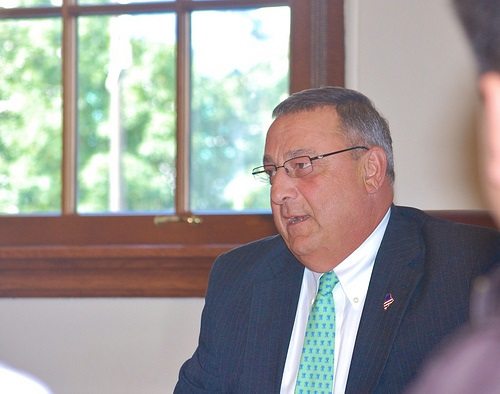
February 17, 2015; Portland Press Herald
Governor Paul LePage and his tax and budget proposals for the state of Maine continue to draw a lot of attention. The NPQ Newswire has recently addressed the governor’s property tax proposal; the impact of the property tax on land trusts in the state and on nonprofit summer camps; and, most recently, the various unintended consequences of his property tax. Now, there is a new twist to consider: the appearance of a “flood of money” the governor says will be coming to nonprofits as an indirect result of his proposed income tax cuts. Will this flood of money be real or is it all just an illusion?
It appears LePage is following the playbook used by many other Republican governors and endorsed by the Republican Governors’ Association and the Heritage Foundation. LePage is one of about a dozen Republican governors who are trying to reduce income tax rates while raising other taxes or generating revenue from other sources to balance their state budgets. Several of the GOP governors, including LePage, are using the “pathway to prosperity” language or concept to argue their case.
Not every Republican governor is playing along though. According to the Heritage Foundation, Iowa’s Terry Branstad, Michigan’s Rick Snyder, and Nevada’s Brian Sandoval are cutting their own path. Branstad and Snyder are both pushing for gas-tax increases without any offsetting tax cuts. Sandoval is proposing to raise business taxes to cover a 12 percent increase in state spending.
In Maine, though, LePage seems to be sprinting down the pathway. In the first town hall meeting of his new term on February 11th, LePage told a crowd in Westbrook, Maine, that he expects his plan will actually help nonprofits:
Sign up for our free newsletters
Subscribe to NPQ's newsletters to have our top stories delivered directly to your inbox.
By signing up, you agree to our privacy policy and terms of use, and to receive messages from NPQ and our partners.
“And there’s going to be all that money available from nonprofits to go and look for donations. And I maintain that the good nonprofits who do good for the community are recognized and there’s going to be a flood of money going to them.”
How does LePage’s plan do this? Among other things, it lowers the income tax rate, requires nonprofits to pay property tax on property valued more than $500,000, and eliminates itemized deductions for charitable giving. It should be no surprise that several groans, perhaps of anguish and disbelief, could be heard from those in attendance in Westbrook, according to the Portland Press Herald.
Despite the bounding optimism of LePage and other Republican’s governors, the pathway to prosperity may have more than a few potholes. One big one is the lack of evidence to support the LePage administration’s contention that deductions for charitable giving will not matter to donors. Jon Bakija, professor economics at Williams College in Williamstown, Massachusetts, published a study in 2013 that showed that high-income people are probably quite responsive to the opportunity for tax incentives. The Congressional Budget Office reported similar findings in a 2011 report:
“Although the underlying motives for charitable giving are complex and not fully understood by economists, empirical studies generally find that taxpayers respond to the after-tax price of giving to some degree. Such tax incentives are limited, however, to the subset of taxpayers who itemize, and they favor high-income people, who face relatively higher marginal tax rates.”
The CBO report highlights that tax deductions for charity is one way the government subsidizes charities. When a taxpayer in the 25-percent bracket donates a dollar to charity, his or her taxes are reduced by 25 cents. Therefore, both the charity and the donor benefit from the tax deduction.
The evidence does not say with certainty that LePage’s plan will not work. However, Brian Galle of Boston College Law School asserts, “The evidence is generally contrary to what the governor is claiming.”
At this point, there appears to be no rush for Maine’s nonprofits to prepare for a “flood of money.” It remains unclear how the Maine legislature will respond to LePage’s tax and budget plan. In the meantime, nonprofits in Vacationland will continue to try to figure whether the governor’s plans are real or mere trickery and illusion.—Tom Klaus













